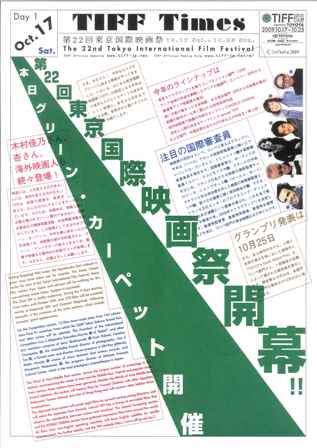2010.01.21[Updates]
Relaying comments: Reflections on 22nd TIFF (Part1)
" I think that the Green Carpet has message of the commitment towards the consciousness of our responsibility for working to make a more ecological and clean world. I think that it's a good idea or a good intention for the film festival to send this idea to hundreds and thousands of people. I consider this as a valuable effort to keep going for the consciousness of the new generation to work for clean environment ".
Alejandro González Iñárritu [ President of the International Competition Jury ]
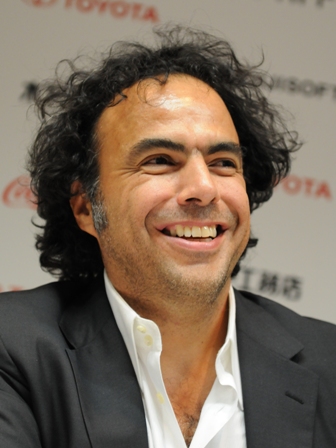
2009.12.28[Updates]
22nd Tokyo International Film Festival – General comments by the juries

We received the general comments from the members who served as juries of respective sections, namely, “TOYOTA Earth Grand Prix”, “Winds of Asia – Middle East” and “Japanese Eyes”.
Enjoy our must-read articles.
・“TOYOTA Earth Grand Prix” General Comment
・“Winds of Asia – Middle East” General Comment:“Winds of Asia – Middle East” section – President of Jury, Mr. Koshi Ueno
・“Japanese Eyes” General “Japanese Eyes” section – President of Jury, Ms. Yuko Sekiguchi
※※ Click to view each general comments.
22nd Tokyo International Film Festival - Awards results
Marking its 2nd year, the impressive drama and documentary film titles from the countries and regions of the world were gathered once again for the “natural TIFF” section, which was started as one of the film screening sections in the Tokyo International Film Festival, under the banner of global environmental protection and human coexistence with nature. As the result made after the careful considerations, including the film entries from different sections produced along this theme; Wolf (directed by Nicolas Vanier / France) won the "TOYOTA Earth Grad Prix” with the consensus of all three judges. The story is about a boy who lives in the harsh mountains of Siberia, who was promised to become a head of the family in the future. While spending the days fighting their natural predators, the wolves; he encounters a wounded she-wolf. Deeply touched when seeing the compassion between the she-wolf and the cub, that was no different from men; a boy decides to protect the wolf by breaking the law set by the family. Directing, acting, and cinematography all zeroed in on the viewers with unison. The film was full of power and precisely depicted the "symbiosis with nature," with an emotional touch. The workmanship of the film was appropriate for the purpose of this award. When the director, Mr. Vanier, received the news of the award, he was greatly pleased and sent us the video message for the award ceremony but couldn’t make a visit. As a sequel to the incident, we later learned that he was a person of principle who wouldn’t aboard the airplane which polluted the earth by scattering gasoline.
We may also add that another allegorical drama, The Mermaid and the Diver (directed by Ms. Mercedes Moncada Rodoríguez / Mexico = Spain) which was based on the legend of the people who live by the sea in Nicaragua, Central America, was also an unforgettable and attractive film as well.
Once again, group of films rich in variety were gathered from the vast regions including the Middle East to Northeastern Asia for the "Winds of Asia – Middle East". The careers of the creators varied from rookies to the veterans, and also the trends of film entries varied from the experimental to the entertainment titles. Amongst those 20 films, Director Ounie Lecomte’s A Brand New Life (Korea = France) was chosen for the “Best Asian – Middle Eastern Film Award”. The film seems to be the director’s autobiographical story, but her skills with controlled narrative which highlighted the girl’s loneliness who was abandoned in an orphanage was so sophisticated that it was hard to believe that she was still a rookie. Her deliberate directing is clearly demonstrated in the opening of the film where a girl clinging to her father’s back who pedals a bicycle, is brought to the orphanage and was fostered out without her knowing it; the face of her father is never revealed in these sequences which include them purchasing her clothes or even in the scene where they eat together.
We can also include I Saw the Sun by the Director, Mr. Mahsun Kirmizigül (Turkey) as the film which earned the special mention. The film which depicted the hardship of the Kurdish family in Turkey, who abandoned their home land because of the civil war and moved to Istanbul, and some even reached Norway; had the use of editing and music which were somewhat old-fashioned, but the excellent film with great motivation was beyond mere story of refugees which incorporated the gender issues in a patriarchal society.
Other films which garnered the attention at the jury meeting were Director, Mr. Maziar Miri’s The Book of Law (Iran); Director, Mr. Shahram Alidi’s Whisper with the Wind (Iran) and furthermore, a cinematic theoretical film, Shirin (Iran), which was directed by a great veteran, Mr. Abbas Kiarostami.
Also, apart from these films, Talentime (Malaysia), a posthumous of Director, Ms. Yasmin Ahmad, who have passed away last year, was a film full of charm which continued The Convert (Malaysia), her last year’s film entry, in which we witnessed her efforts to step out towards the wider world, when compared from series of films starting with her first, which was centered on the story about the family life. Therefore her death was extremely sorrowful, but with that note in our mind and considering that all of her works have screened at TIFF; we presented the “Winds of Asia – Middle East, Special Award for Lifetime Achievement” to Director, Yasmin Ahmad.
The “Japanese Eyes” which met its 6th session this year, introduced the lineup of films, which were very much like scooping the diversity in a nation called Japan with a large net. The mesh of the net was extremely large and there were some film titles which tended to slip through the net. But the characteristics of the works collected here varied, starting with the peculiar film, which in a sense had an air of refusal to be seen, following with the film which made a bold visual challenge, or film which harmonized the cultural genres such as painting, calligraphy and music, and also the film which showed the naked uncertainty of a writer; which can all be unmistakably called the works about "modern day Japan."
These selections were focused to show the diversity to the "viewers abroad." The decision for the choice was made, not for the reasons that the films looked well when seen together with other works or because of their cultures or characteristics that stood up when compared with the others, but the decisive factor was the sole lambent individuality of the film and its potential for the future. The Best Picture Award was given to a single film. We had no intentions to increase the awardees. We presented the award to the LIVE TAPE directed by Mr. Tetsuaki Matsue, which captured the street live performance of a singer-song-writer with the self-convinced lengthy continuous shot.
List of respective film reviews:
OUR BRIEF ETERNITY
Director: Mr. Takuya Fukushima
【Reviews】
The mere presence of Kouta Kusano connected the film and reality (the audience). This film shows a certain community. The conversations are completed within this community, thus if the audiences do not make efforts to show interest and understanding, they will be declined from viewing the film. However, this sense that the film holds is distinctly like the way the modern day Japan is like.
To Walk Beside You
Director: Mr. Yuya Ishii
【Reviews】
Film is a well written and is created with the swinging tempo and music. The depiction of the film up to the characters coming out to the big city is wonderful. But the ambiguity of the comparison between the sex with the high school classmate, in contrast with the hero’s sex with the woman who lives in reality, may have produced the unintentional effect for the director. Common opinions among the juries were their limitless interest for the future of this author.
Jungle-House Three-Farts / Sanpei Hayashiya
Director: Mr. Toshiyuki Mizutani
【Reviews】
For better or worse, this is a documentary showing the charms of the late Master comedian, Sanpei Hayashiya rather than a film. While you can see how and why he became the Japan's first TV comedian, it also lacks an objective and critical perspective and seems like Ebina (Sanpei’s) family movie. But the film is important as a record.
The Night of Whirlwind Restaurant
Director: Mr. Tetsuo Shinohara
【Reviews】
Snow piles up on a white plate. Before long the snow begins to quietly accumulate and becomes one restaurant in the street corner. The spirit of the intention to create the world of fantasy for adults shows throughout the films in camera angles and calligraphy of the titles. The visual where the window transforms into the screen in another dimension is beautiful. There is stability in this film as sense of superb fantasy that gives us the moment of repose, but is rather lacking in the experimental efforts to portray the modern day Japan. But we may be wrong to ask for it to begin with.
Palm of the Hand Stories
Directors: Mr. Takushi Tsubokawa, Mr. Nobuyuki Miyake, Mr. Tsukasa Kishimoto and Mr. Yuya Takahashi
【Reviews】
We acknowledged the enthusiasm to make the adaptations of Yasunari Kawabata’s story, but setting the period of this film similar to the original piece worked negatively. As the result, the audiences realized how difficult it was to create a sense of time with in the limited budget and how hard it was to create the air of the period for the modern young actresses and actors. In particular, because of Director, Mr. Hiroshi Shimizu’s Mr. Thank You (1936, production year), we couldn’t help comparing it to Thank you, an episode in this film title. The opinions of all the juries were that it could have been better if the films were created as contemporary pieces.
TOCHKA
Director: Mr. Hiroyuki Matsumura
【Reviews】
Film received high evaluations because it was experimental and cinematic. The dramatics performed by the two players, Ms. Yoko Fujita and Mr. Shun Sugata, and the directions which used window of Tochika (a military pillbox enclosure) as a screen was wonderful. Above all, the evaluations focused on the air of heaviness in the long narrative of Mr. Sugata before he sets the fire. But the film didn’t receive the Grand Prix because there was a slight uneasiness with the sound recording and the processing of the film which was unintentional for the director.
If Blessed
Director: Mr. Kite Okachimachi
【Reviews】
The crime brought the man and the woman together. Their changes of emotions were performed in the scenes where there were no significant movement or episodes; Ms. Machiko Ono and the rookie, Mr. Masashi Kubota were wonderful receiving a great reputation. The sorrowfulness of sharing love making beyond the distance of the room in apartment and the prison cell would remain in the film history. However, there was too much music. Also the conceptual part of the film didn’t make us feel its catharsis but rather gave us the feeling of the oldness.
LIVE TAPE
Director: Mr. Tetsuaki Matsue
【Reviews】
We gave a high evaluation to the ability and delicate directorial skills of Director Matsue who created a film which at first glance seemed to be like the haphazard rolling of the video tape, but this actually was self-convincing and intentional effort. We gave this film a unanimous vote as a winner for Best Picture Award. The talent of the filmmaker dwelled throughout the film, namely the skill of setting the distance between the camera and the subject, the method of affirming the human existence, and the way the theme was revealed. The vitality of Kenta Maeno’s singing voice resonated with the film and gave a spark to it.
2009.12.24[Updates]
23rd Tokyo International Film Festival : October 23 (Sat) - October 31 (Sun), 2010

Date:October 23 (Sat) - October 31 (Sun), 2010
Venues:Roppongi Hills (Minato City), theaters, halls and other facilities in Tokyo metropolitan area.
23rd Tokyo International Film Festival Outline
23rd Tokyo International Film Festival Official Site
2009.10.25[Updates]
Lists of Awardees: Tokyo Sakura Grand Prix goes to Eastern Plays!!

Competition section:
Director Kamen Kalev
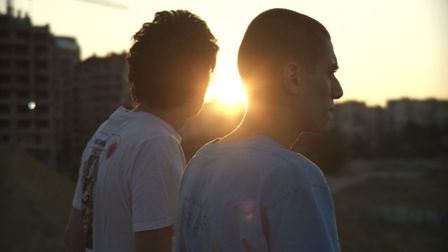
Director Sebastián Cordero

Director Kamen Kalev
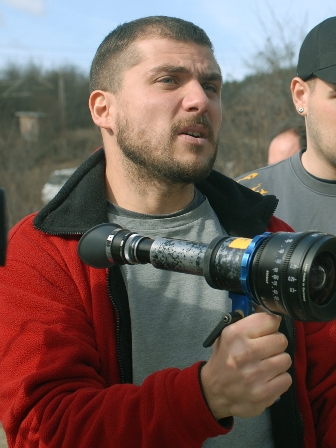
Julie Gayet

Christo Christov

Director Nicolas Vanier

Winds of Asia – Middle East section:
Director Ounie Lecomte
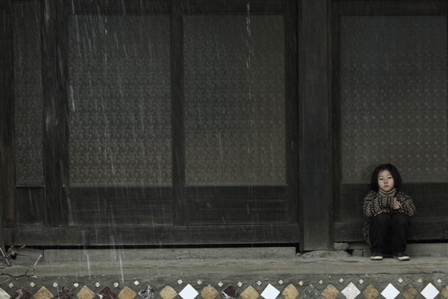
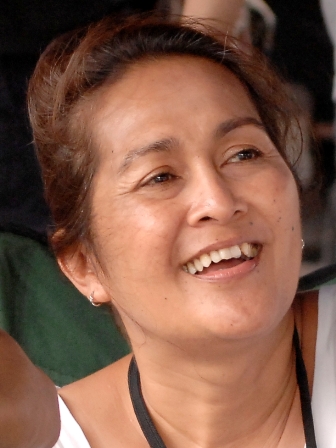
Director Mahsun Kirmizigül
Japanese Eyes section
DirectorTetsuaki Matsue
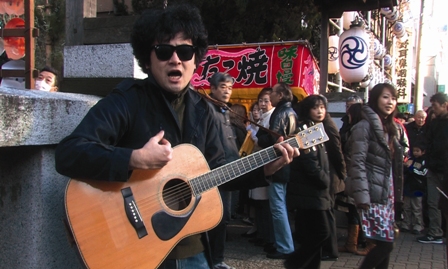
2009.10.25[Updates]
22nd Tokyo International Film Festival – Closing Ceremony
Firstly, the announcement for the Best Picture Award of the Japanese Eyes section, was made by Ms. Yuko Sekiguchi of Japanese Eyes Jury.
Japanese Eyes section
Best Picture Award went to LIVE TAPE,. Director Tetsuaki Matsue

The announcement for Winds of Asia – Middle Eastern Film Award was made by Mr. Koshi Ueno of Winds of Asia – Middle East Jury.
Winds of Asia – Middle East section
Best Asian-Middle Eastern Film Award went to A Brand New Life, Director Ounie Lecomte
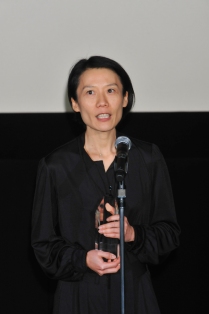
The announcement for TOYOTA Earth Grand Prix was made by Chairman Tom Yoda. The trophy was presented by the Toyota Motor Corporation, Executive Managing Director Norihiko Arai.
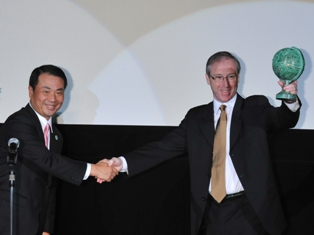
TOYOTA Earth Grand Prix
TOYOTA Earth Grand Prix, screened by natural TIFF section went to WOLF, Director Nicolas Vanier.
Finally the announcements for the Competition section
First of all, The announcement for The Audience Award of the Competition section which was chosen and announced at the Commendation Ceremony by the audience on Oct. 24th (Sat).
The Audience Award went to The Trotsky, Director Jacob Tierney
Award for Best Actor, went to Eastern Plays, Christo Christov
Award for Best Actress went to Eight Times Up, Julie Gayet
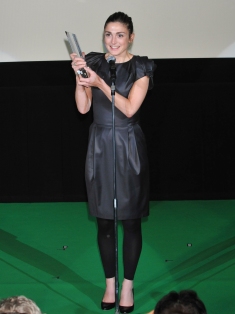
Award for Best Director went to Eastern Plays, Director Kamen Kalev
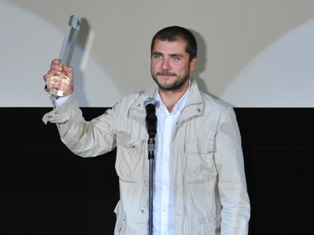
Special Jury Prize went to Rabia, Director Sebastián Cordero

The respective Awards were presented and finally the presentation of the Tokyo Sakura Grand Prix.
The Tokyo Sakura Grand Prix went to Eastern Plays, Director Kamen Kalev


Following the speech on the over-all judgment by the President of Jury, Alejandro González Iñárritu, who thanked the Chairman Tom Yoda for the invitation, expressed his joy for being able to return to Tokyo International Film Festival where he received the Award nine years ago. He also mentioned that the Film Festival is a place that allows the people to watch various films from the world and said that he hoped that many films which entered the Tokyo International Film Festival would be able to find a distribution company here in Japan.
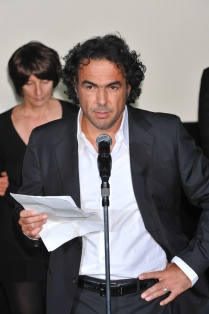
Finally, Chairman Tom Yoda expressed his appreciation for being able to close the Tokyo International Film Festival with great éclat. Since last year, Chairman has commenced the Green Carpet with a wish to send the message of protecting the beautiful earth, its environment and ecology through the film festival. TIFF would like to be considered as runner-up to Cannes International Film Festival, Venice International Film Festival and Berlin International Film Festival in terms of news value, but also would like to present the high quality film titles. He finished his speech with the hope of prospects of the 23rd TIFF which will be held next year...
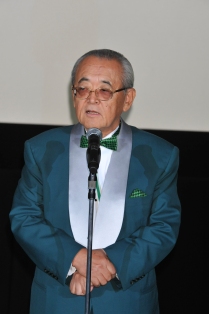
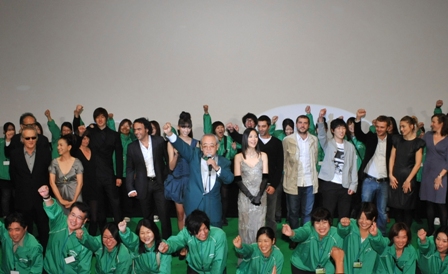
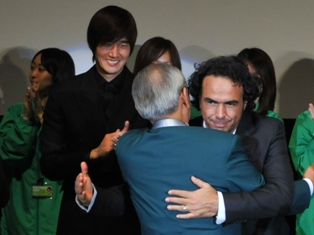
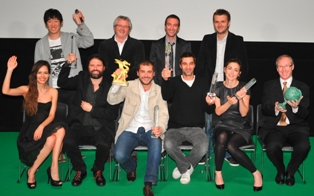
2009.10.25[Updates]
News on Closing Ceremony Live Delivery


※If you do not see the play button at the starting time of the delivery, please push the “reset” on the browser page.
The Closing Ceremony Live will deliver the Commendation Ceremony held on the last day of the festival.
The Closing Ceremony in which the announcements of the Awards including the Competition sections, Tokyo SAKURA Grand Prix, will be delivered by Internet. Please enjoy the excitement of the Closing Day with the live coverage delivery.
Catch the TIFF tiff-jp.net wave!
Closing Ceremony Live Delivery
Oct. 25th (SUN) 14:00 - (May be extended up to 17:00 max.)
Viewers will need the latest Windows Media Player to watch the live internet delivery.
Click here to download the software.
The visuals may not be delivered smoothly depending on computer capacity, time zone and line connections.
*Please note that the video delivery will not support any versions older than Mac OS9 for Mac users.
→ Read more
2009.10.24[Updates]
The Winner of The Audience Award !
The film is a piquant adolescent comedy about a boy who believes he is a reincarnation of Leon Trotsky who was an iconoclast and a Red Army hero of the early 20th Century Soviet Union which depicts the commotion of his attempts to reform the school that he attends.
Following the film screening, the theater was enveloped in the mood of frenzy. The marvelously cheerful film successfully received The Audience Award.
The Commendation Ceremony was held on Oct. 24th (Sat) at the TIFFpark, Director Jacob Tierney and the Producer Kevin Tierney appeared on the stage.
Mayor Masaaki Takei of Minato City announced the winner and the commendation certificate, trophy and the prize money were presented to Jacob Tierney.
The customary Happi coat was presented to the winner and Jacob slipped into the Happi coat shyly.

Acceptance Speech
Director Jacob Tierney:
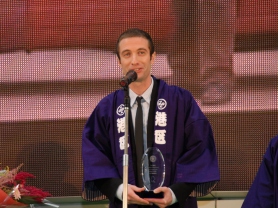
Domo Arigato”
We are so honored to receive this award from the audience here.
We’re very moved and very humbled. We wish to thank the Tokyo International Film Festival, especially all the volunteers who worked so hard.
On our behalf and on behalf of all filmmakers, we’re very grateful to come here and be treated so kindly by everyone. We had such a wonderful time. Thank you so much.
Producer Kevin Tierney
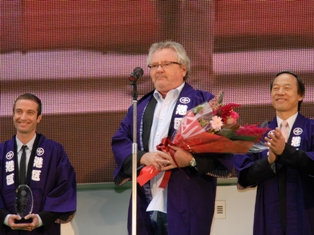
I’d like to echo Jacob’s sentences in extending our gratitude to all of the organizers, programmers and volunteers.
(Addressing the full audience filling the theater.)
I see so many parents and grandparents here with their children, I’m not just a producer of the film, I’m also the father of the director; so I’m doubly grateful! Arigato!

2009.10.21[Updates]
Message from James DeMonaco, Director of Staten Island(Competition Section)
Oct. 21 (Wed) 21:20 (Door opens at 21:00)
Oct. 23 (Fri) 10:50 (Door opens at 10:20)
Ticket:
Oct. 23 (Fri) Walk-up tickets available at t-pia or at l-ticke.com (Purchse procedures in Japanese only)
Director’s Message:
As a native Staten Islander, I was always, even as a young boy, very well aware of my hometown’s unfavorable reputation. Often mocked, but even more often forgotten and neglected by most New Yorkers, Staten Island barely exists outside its own borders.
Staten Island is, by all accounts, the forsaken borough of New York, alone in this stature, a mistreated stepchild of its closest neighbor - the ever-present, ominous borough and centerpiece of not only New York but of all American life - Manhattan.
As any native Staten Islander can attest, Staten Island lives in the grand shadow of Manhattan’s wondrous, all-consuming skyline.
This can be a very dark, desperate place to live.
My objective as the writer and director of STATEN ISLAND was to capture the essence of the Island - or what I perceived as its essence - insignificance. And, ultimately, how the borough’s insignificance permeates and informs the people who populate this neglected place - as this sense of irrelevance informed my own life as a Native Staten Islander and affected how I viewed myself in society.
I chose to depict three Staten Island men battling this sometimes overwhelming feeling of insignificance - THE MOBSTER, as Staten Island has more mobsters than any other borough in New York and as I grew up living next door to several Staten Island Mob families; THE DELI WORKER, as Staten Island has more delicatessens than any other borough and as I worked in a local Staten Island deli in my youth; and THE SEPTIC TANK CLEANER, as the Island is the only borough still utilizing septic tanks as a means of waste removal.
Ultimately, the film’s depiction of these Staten Island men and their struggles, is, in the end, not specific to Staten Island and its occupants - but opens up beyond the borders of New York and essentially reflects upon greater themes of significance, ego, and self-worth, and how any individual in any society defines his or her place - and how incredibly varying these definitions can be.
My intent was not to depict STATEN ISLAND in an ultra-realistic manner - but instead to metaphorically define this unique, forgotten place and its people. The depiction was an amplified presentation, using humor, heightened drama, archetypal characters, crime noir elements, and even absurdity to portray the often desperate plight of these three men in their often misguided search for meaning and self - as my own desperate search for self and significance in the world was often melodramatic, humorous, criminal, and very very absurd.

→ Read more
2009.10.18[Updates]
Message from Sebastián Cordero, Director of Rabia(Competition Section)

Oct. 18th (Sun) 21:30 (Door opens at 21:00)
Oct. 22 (Thur) 17:50 (Door opens at 17:30)
Ticket:
Oct. 18th (Sun) Walk-up tickets available at t-pia (Purchse procedures in Japanese only)
Oct. 22 (Thur) Walk-up tickets available at t-pia or at l-ticke.com (Purchse procedures in Japanese only)
Director’s Message:
After having killed a man, José María chooses to hide inside a mansion and becomes invisible in order to remain close to the person he loves. Without anyone knowing he is there, he becomes a ghost-like voyeur and a witness to what is happening in the house. Half-heard conversations; dramatic moments interrupted by the risk of being discovered; characters partially glimpsed from the shadows: José María’s day-to-day life is marginal. He is like a wild animal: afraid of being discovered, and afraid of what he himself might discover about Rosa, the woman he loves, who works and lives in the mansion, so close to him yet unreachable.
José María leads an invisible and lonely life, and like many Latin American immigrants in Spain, his only comfort comes from the hope of a reconnection with his loved ones. It doesn’t matter that he and Rosa have only recently met: when he finds a second phone line and contacts her again, his discovery fuels the hope for a reunion one day. José María calls Rosa in a continuous shot that connects them for the first time in weeks, starting with him dialing then travelling through the house towards a ringing phone in the living room below. The smooth, ominous steadycam movements enhance our feeling that he is becoming the eyes and ears of this mansion, sharing a space with Rosa without being able to touch her.
Aesthetically, the film goes from a relatively “conventional” visual narrative to some very extreme and stylized moments, which reflect the changes and decay inside José María, as his isolation wears him down. His conversations with Rosa become the heart of their “long-distance” relationship, as months pass.
While they fantasize about a life together, the decadent mansion only reflects the remains of what are now extinct moments of happiness. Most of the memories there have been stored in the attic where José María hides, and they feed his dream of one day having a family. Ironically, the Torres and their children epitomize the decay of relationships, and of love: this is a family that has lost the capacity to stay together, except through self-interest or fear of loneliness.
The “rage” in RABIA alludes to José María’s growing fury at being denied something basic: respect, love, a family. He rebels by hiding, becoming invisible. José María thinks this is his only option, but his situation is contradictory and hopeless, because ultimately he doesn’t want to disappear.
Sebastián Cordero

→ Read more
2009.10.17[Updates]
Circulation for TIFF Times starts today!

TIFF Volunteer Crews are handing out the TIFF Times at Roppongi Hills where the festival is held!
You can pick up the back issues at the Information Booth.
We encourage you to take it in hand and flip through it when you have a chance to visit the Film Festival venue!!
